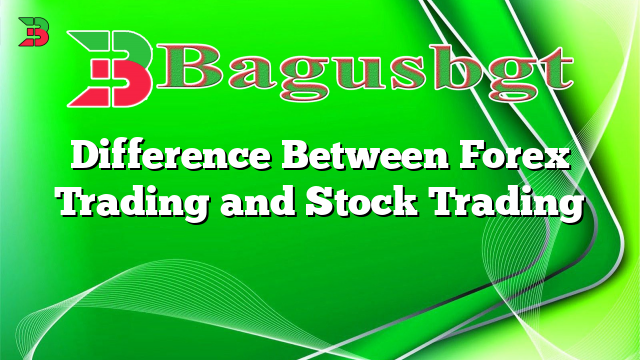Hello, readers! In this article, we will explore the key differences between forex trading and stock trading. Both forms of trading offer unique opportunities for investors, but they operate in distinct markets with different characteristics and risks.
1. Market Accessibility
Forex trading, also known as foreign exchange trading, involves the buying and selling of currencies. It is the largest and most liquid market in the world, open 24 hours a day, five days a week. On the other hand, stock trading involves the buying and selling of shares of individual companies in public stock exchanges, such as the New York Stock Exchange or London Stock Exchange.
Forex trading offers greater accessibility as it allows traders to participate in global markets. Stock trading, on the other hand, is limited to specific trading hours and requires access to individual stock exchanges.
2. Trading Volume and Liquidity
The forex market has a massive trading volume, estimated to be around $6.6 trillion per day, making it highly liquid. This high liquidity ensures that traders can enter or exit positions at any time without significant price fluctuations. In contrast, stock trading volumes are comparatively lower, resulting in less liquidity and potentially larger price fluctuations.
3. Trading Hours
Forex trading operates 24 hours a day, five days a week, allowing traders to react to global events and news instantly. Stock trading, however, is limited to specific trading hours based on the exchange’s operating hours. The trading hours may vary depending on the country and exchange.
4. Market Transparency
Forex trading is decentralized, meaning it does not have a central exchange. Instead, it operates through an interbank market and over-the-counter (OTC) transactions. This lack of centralization may result in a slightly less transparent market compared to stock trading, which is regulated and publicly traded on centralized exchanges.
5. Volatility and Risk
The forex market is known for its volatility due to the constant fluctuations in currency exchange rates. This volatility provides opportunities for both profit and loss. Stock trading, while still subject to market volatility, may have more stable price movements compared to forex trading. However, individual stocks can be highly volatile, especially during major company announcements.
6. Leverage and Margin
Forex trading allows traders to use leverage, which means they can control larger positions with a smaller amount of capital. This enables potential higher returns but also increases the risk of significant losses. Stock trading typically has lower leverage options, with margin requirements varying between brokers and stock exchanges.
7. Market Influences
Forex trading is influenced by various factors, including economic indicators, geopolitical events, and central bank policies. Stock trading, on the other hand, is influenced by company-specific news, earnings reports, and industry trends.
8. Diversification Opportunities
Forex trading offers limited diversification opportunities as it primarily focuses on currency pairs. Stock trading, on the other hand, provides the opportunity to invest in various industries and sectors, allowing for greater diversification of investment portfolios.
9. Trading Costs
Forex trading often involves low transaction costs, as most forex brokers make money through the bid-ask spread. However, there may be additional fees depending on the broker. Stock trading may involve brokerage fees, commissions, and other charges, which can vary depending on the exchange and the type of order.
10. Regulatory Environment
Forex trading is regulated globally, but regulations may vary from country to country. Stock trading is subject to strict regulations and oversight by financial authorities in each country where the stock exchange operates.
Alternative Perspective on the Difference
While the above points highlight the primary differences between forex trading and stock trading, it is essential to note that both forms of trading require knowledge, skills, and a disciplined approach. Understanding the specific market dynamics and having a well-defined trading strategy are crucial for success in either market.
Aspect |
Forex Trading |
Stock Trading |
|---|---|---|
Market Accessibility |
24/5 global market |
Specific trading hours |
Trading Volume |
Massive liquidity |
Lower liquidity |
Trading Hours |
24 hours a day, 5 days a week |
Specific trading hours |
Market Transparency |
Decentralized market |
Regulated and centralized exchanges |
Volatility and Risk |
High volatility |
Lower volatility (in general) |
Leverage and Margin |
High leverage options |
Lower leverage options |
Market Influences |
Economic indicators, geopolitical events, central bank policies |
Company-specific news, earnings reports, industry trends |
Diversification Opportunities |
Limited diversification |
Various industries and sectors |
Trading Costs |
Low transaction costs |
Brokerage fees, commissions, other charges |
Regulatory Environment |
Global regulations |
Strict regulations in each country |
Frequently Asked Questions (FAQ)
Q: Which market offers higher profit potential?
A: Both forex trading and stock trading offer profit potential. The profit potential depends on various factors such as market conditions, trading strategies, and the trader’s skills and knowledge.
Q: Is forex trading riskier than stock trading?
A: Forex trading and stock trading both involve risks. The level of risk depends on factors such as market volatility, leverage used, and the trader’s risk management strategies.
Q: Can I trade both forex and stocks?
A: Yes, many traders engage in both forex trading and stock trading. However, it is essential to understand the unique characteristics of each market and develop separate strategies for trading them.
Conclusion
In conclusion, forex trading and stock trading differ in market accessibility, trading volume, trading hours, market transparency, volatility, leverage, market influences, diversification opportunities, trading costs, and regulatory environments. Both forms of trading have their own advantages and risks. It is crucial for traders to carefully consider their investment goals, risk tolerance, and market knowledge before engaging in either forex or stock trading.




